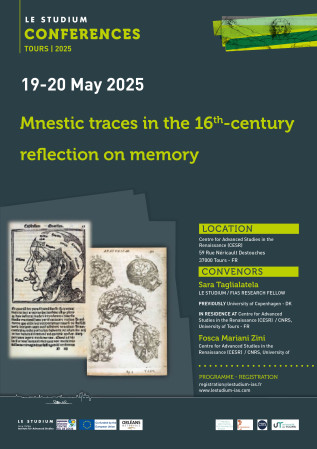Sara Taglialatela

From
In residence at
Centre for Advanced Studies in the Renaissance (CESR) / CNRS, University of Tours - FR
Host scientist
Fosca Mariani Zini
BIOGRAPHY
Sara Taglialatela holds one PhD in Philosophy (Theoretical Philosophy) from the Ca’ Foscari University in Venice (2009) and one joint PhD in Philosophy (History of Philosophy) from the Freie Universität Berlin and the Scuola Normale Superiore, Pisa (2018).
After having studied Giordano Bruno’s ars memoriae and the relation between his works on mnemonics and philosophy in the first phase of his reflection (1582–1585), she has researched Bruno’s stay at Wittenberg (1586–1588) to identify possible interweavings of the discussions on the artes liberales among the Lutherans at the Leucorea University (September 2021-August 2024, Marie Skłodowska-Curie Fellowship at the Faculty of Theology, Church History Section, University of Copenhagen).
Her research interests are: contemporary debate (continental and analytical traditions) on the use of metaphors in philosophy and science; philosophy of memory; philosophical historiography and metaphorology as an auxiliary discipline of the history of philosophy; historical-metaphorological reconstruction of the mnemonic tradition and its interplay with the philosophical theories of memory up to the seventeenth century; Hans Blumenberg; Giordano Bruno; Philipp Melanchthon; Michel de Montaigne.
PROJECT
Philipp Melanchthon, Giordano Bruno, and Michel de Montaigne on memory and oblivion: Three case studies on philosophy of memory in the sixteenth century.
With the proposed project I aim (1) to shed light on thinking about memory and oblivion in the sixteenth century and (2) to identify a new research field in the history of Renaissance philosophy which I will call
“philosophy of memory.” Through textual analysis I will investigate how Philipp Melanchthon, Giordano Bruno, and Michel de Montaigne conceived of, reflected on, and wrote about memory and oblivion at the intersection of some of the most important disciplines of the sixteenth century (i.e., philosophy, theology, and medicine; philosophy, rhetoric, and mnemonics; philosophy and literature) to show how they contributed to the formulation of modern topics such as the soul-body problem and concepts of time, space, and self-consciousness. This project, informed by analytical (philosophy of memory) and phenomenological
(metaphorology) approaches, will also profit from engaging with the study of the inner writing and book of nature metaphors in the works of the three authors. The expected result of the project is an interpretation model for the history of the ideas of memory and oblivion that can also be applied to other research topics and to different historical timeframes. CESR at the University of Tours is the perfect choice of host institution for MEMO16. CESR not only boasts a unique interdisciplinary research environment comprised of renowned researchers in Reformation history, history of rhetoric, history of French literature, history of medicine, and Renaissance philosophy, but CESR is also the host institution of the ANR (French National Research Agency) project ANTHRAME (ID: AAPG2021): “Les pouvoirs de l’ame: Anthropologie de l’experience, XIVe–XVIes (The faculties of the soul: Anthropology of experience between fourteenth and sixteenth centuries).” ANTHRAME’s project coordinator, Prof. Fosca Mariani Zini, will be MEMO16’s host scientist. The required literary sources are readily available for scholars at CESR via the CESR library. The project has been planned to (1) enhance my profile as an interdisciplinary scholar, (2) open career paths for me in France, and (3) evaluate the possibility of a broader project on the philosophy of memory in the Renaissance immediately after or shortly after the FIAS fellowship.
 |
This project has received funding from the European Union’s Horizon 2020 research and innovation programme under the Marie Skłodowska-Curie grant agreement No 945408 |



